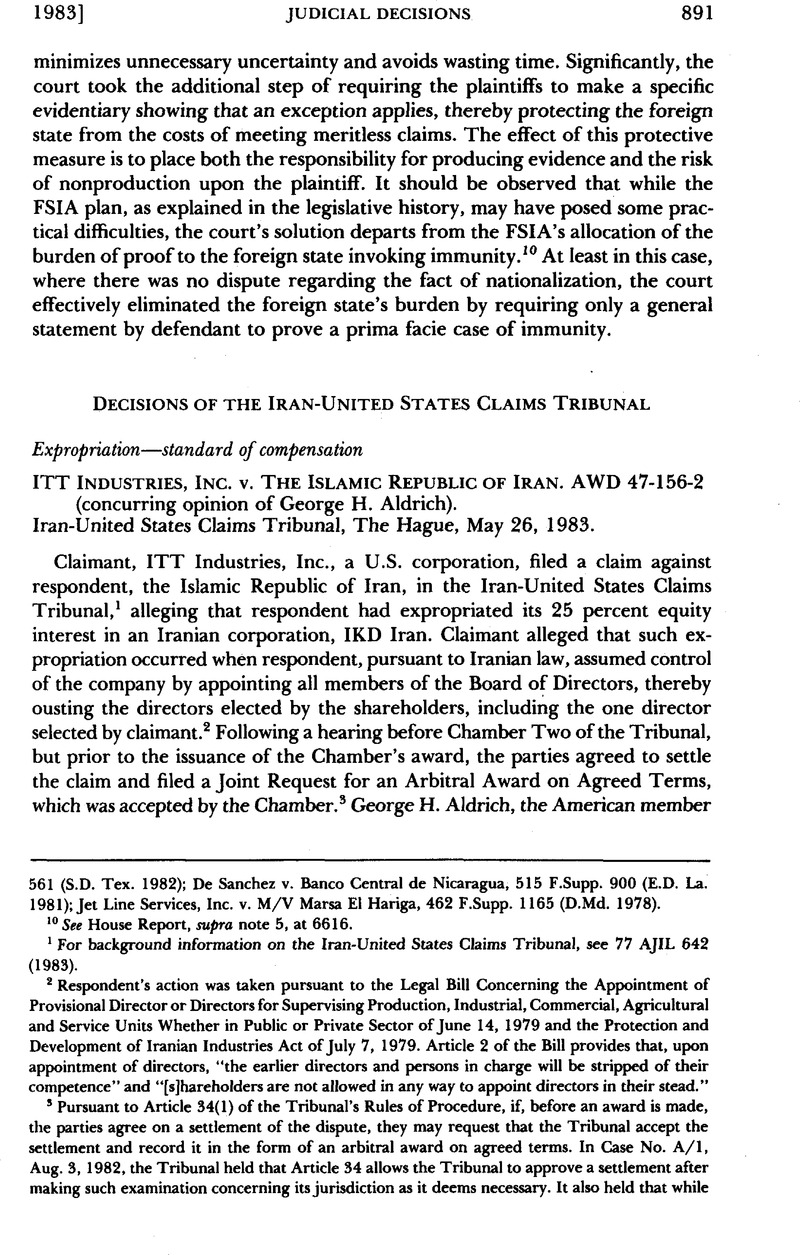No CrossRef data available.
Article contents
ITT Industries, Inc. v. The Islamic Republic of Iran
Published online by Cambridge University Press: 27 February 2017
Abstract

- Type
- Judicial Decisions
- Information
- Copyright
- Copyright © American Society of International Law 1983
References
1 For background information on the Iran-United States Claims Tribunal, see 77 AJIL 642 (1983).
2 Respondent’s action was taken pursuant to the Legal Bill Concerning the Appointment of Provisional Director or Directors for Supervising Production, Industrial, Commercial, Agricultural and Service Units Whether in Public or Private Sector of June 14, 1979 and the Protection and Development of Iranian Industries Act of July 7, 1979. Article 2 of the Bill provides that, upon appointment of directors, “the earlier directors and persons in charge will be stripped of their competence” and “[s]hareholders are not allowed in any way to appoint directors in their stead.”
3 Pursuant to Article 34(1) of the Tribunal’s Rules of Procedure, if, before an award is made, the parties agree on a settlement of the dispute, they may request that the Tribunal accept the settlement and record it in the form of an arbitral award on agreed terms. In Case No. A/1, Aug. 3, 1982, the Tribunal held that Article 34 allows the Tribunal to approve a settlement after making such examination concerning its jurisdiction as it deems necessary. It also held that while the Tribunal will, not review the reasonableness of the settlement, it can refuse to record a settlement if it does not appear to be appropriate in view of the framework provided by the Algiers Accords.
4 Aldrich stated that his rationale for issuing the opinion, despite the settlement of the claim, was his belief that the settlement should not “deprive the parties or the public of these views on important questions of international law,” particularly since “the settlement may well have been inspired, at least in part, by the Respondent’s desire to prevent these views from appearing in the Award.”
5 Citing Barcelona Traction, Light & Power Co., Ltd. (Belgium v. Spain), 1970 ICJ Rep. 3, 36 (Judgment of Feb. 5).
6 Treaty of Amity, Economic Relations and Consular Rights between the United States and Iran, Aug. 15, 1955, 8 UST 899, TIAS No. 3853.
7 Aldrich noted, however, that the International Court of Justice held that the Treaty was still in force in 1980. See Case Concerning United States Diplomatic and Consular Staff in Tehran (U.S. v. Iran), 1980 ICJ Rep. 3, 28 (Judgment of May 24).
8 Citing Chorzów Factory case, 1928 PCIJ, ser. A, No. 17, at 47 (compensation defined as “the value of the undertaking at the moment of dispossession, plus interest to the date of payment”).
9 Aldrich estimated compensation on this basis in terms of Iranian rials; he did not, however, convert the amount into a dollar figure, provide a conversion rate, or discuss the time at which the exchange of currencies should be computed. Likewise, he did not address the issue of interest, though he alluded to it by quoting earlier in his opinion from the Chorzów Factory case. See supra note 8.


